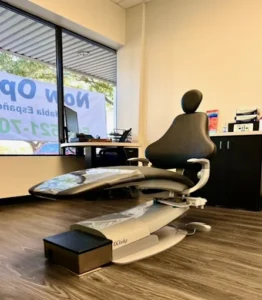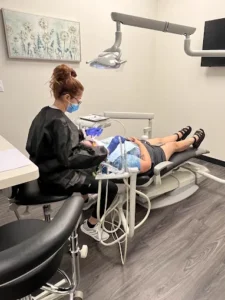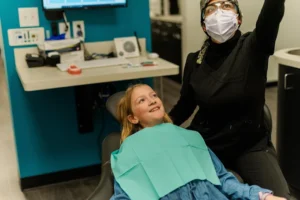Your tooth fell off, and it doesn’t hurt? Children lose their baby teeth so that the permanent or adult teeth can grow again. However, sometimes it should be observed that some adult or permanent teeth break and fall out at the gum line, but it doesn’t hurt. These types of accidents may happen, and people may require immediate dental treatment for their broken teeth.
You must be thinking why my tooth fell out, but it doesn’t hurt, and what to do about it? Read on to find out why this teeth problem happens, how to handle and what to do in this situation, and what’s the most suitable treatment option for it.
Why Does My Tooth Fell Out But It Doesn’t Hurt?
You must be thinking why a broken tooth doesn’t cause pain. Well, it is because of several reasons that a dentist can better tell you. Here are some common possible reasons for it:
- The nerve has already died, most probably at the time of the fracture.
- The tooth was already dead.
- A person may have had a root canal in which the nerve was already removed.
Despite these, if there is no pain, the tooth can also become infected. So, it is suggested to visit your dental expert to avoid other dental complications.
What to Do If Your Damaged or Decayed Teeth Fall Out?
Many people have damaged teeth, and they don’t know about it until it falls out. It is very important to stay informed about your oral health to prevent any dental issues. If your decayed tooth breaks and falls out, the first thing you have to do is not panic and stay calm. Here are some useful things you should do:
- Preserve the Fallen Tooth: If your decayed tooth has already been chipped out when adults, try to avoid touching the root of the tooth to prevent infection. You can just try to handle the situation by touching only the crown, which is the upper-white part visible inside the mouth. Put the tooth in a clean jar or container of tooth-preserving solution like Hank’s Balanced Salt Solution or a cup of milk. Do not use water for tooth preservation, as it can damage the cells of the root surface.
- Control Tooth Bleeding: However, in case there is blood from the socket, you should apply the pressure by pinching the gauze or cloth and holding it there for about 10-15 minutes until the blood clots or bleeding stops.
- Call your dentist. Immediately: Don’t waste your time; contact your dentist or seek an emergency dental clinic within the shortest time. To save your tooth, try to reach the dentist within 30 minutes to an hour after the tooth has fallen.
- Clean Your Mouth: You should gently rinse your mouth with warm water to eliminate the blood or any debris in the oral cavity but don’t disturb the particular area if blood clots have begun to form in the socket.
- Cold Compress: If you feel redness, swelling, or more pain, you can use a cold compress for temporary relief. Applying a cold pack or ice wrapped in a towel or any other cloth on the affected area helps reduce inflammation.
- Pain Management: If you have unbearable or severe pain, you can take over-the-counter medications such as ibuprofen or acetaminophen. These medications are good painkillers that will help you to reduce pain until you can reach the dentist. However, taking ibuprofen can be dangerous sometimes, so it’s better to consult with an oral expert before taking it or use other prescribed medicines to reduce pain.
- Oral Hygiene: Maintaining oral hygiene is still the most important thing to avoid further dental complications. You can gently brush your teeth and do all that is required to maintain hygiene around the empty socket, but make sure to not interfere with the clotting process. Using a soft-bristled brush and avoiding harsh brushing on the wounded area is helpful.
- Don’t disturb the area: Some people have bad habits of putting fingers in their mouth for nail-biting or the tongue on the tooth sockets. Remember that when you have a tooth break out, you should not come into contact with the empty socket because it will slow down the healing process.
- Food Intakes: You should not do anything that disturbs the empty socket. Eating hard or crispy foods and other chewy substances from the side where the tooth has fallen out can lead to displaced blood clots, and the healing becomes delayed. Take soft or easy chewy foods can be helpful to heal fast.
Remember that every person’s tooth condition differs after losing a tooth, or if you have a decayed one. One can face several consequences affecting oral and general health in every case. Consulting with an oral professional is always the right option because a dentist will give you advice on what treatment is best available for you depending on the extent of tooth damage.
So, it’s important to prioritize professional oral care to prevent further dental problems and maintain a healthy smile.
Professional Treatments for Tooth Broken
In most cases of people, a dentist will be able to restore the tooth. But, sometimes, in severe cases, patients need tooth extraction to avoid further dental problems.
Here are some treatments for broken teeth:
Root Canal & Crown
If the tooth of a patient can be restored, the dentist may go for a dental crown. In this treatment, the dental care expert attaches a crown, and the tooth root stays fixed inside the gums. A patient doesn’t feel pain because the tooth nerve is already dead, so a dentist will take this nerve away through a root canal treatment, and then the canal will be filled. If this nerve is not taken away, then it can rot and cause infection.
After this process, the dentists do a core buildup in order to fill the tooth hole. Finally, the crown will be placed on the affected tooth to cover it completely; it gives a natural tooth look as you desire.
Crown Lengthening
Your dentist may advise you to lengthen the crown if your tooth is damaged, but there is still little structure remaining to support a crown. In this dental process, a dental expert removes the surrounding bone of the tooth. So that there will be a more visible portion of the tooth above the gum line.
Using this dental technique will assist in restoring the tooth, but remember that the bone is not going to grow back. So, before taking any of such oral treatments, consulting your dentist about the side effects is suggested.
Forced Orthodontic Eruption
This treatment is the same as crown lengthening, creating a longer-looking tooth than the natural tooth above the gum line. A dentist will attach a bracket to the particular tooth and slightly extrude it above the gum line. This dental process is time-consuming, but ensure you do it with precision to get the desired results. But still, this dental procedure doesn’t have any irreversible consequences.
Thinking About What to Do with Broken-Off Tooth?
Is your tooth falling out at the gumline but doesn’t hurt? Don’t worry about that!
Celebrate Dental is always available to hear all your dental concerns and provide you with the best suitable treatment for your healthy smile. Do not hesitate to contact us now!









